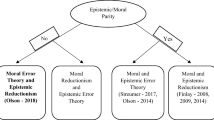Abstract
Companions in guilt arguments are widespread in defenses of moral realism and criticisms of error theory. Recently, a number of philosophers have argued that the companions in guilt argument fails because it makes untenable assumptions about the existence of categorical epistemic reasons. In this article, I develop an alternative version of the companions in guilt argument that does not succumb to this criticism, as it begins with the claim that there is a presumptive case in favor of attributing a belief in categorical norms of philosophical argumentation to proponents of the error theory. I then point to an instability in the error-theoretic position and explore the extent to which this instability poses a serious philosophical problem. While this argument has a narrower scope than the traditional companions in guilt arguments, I conclude that it nonetheless poses a significant challenge to any philosophical attempt to deny the categoricity of moral reasons.
Similar content being viewed by others
Notes
Some recent accounts, such as Das 2017, have shifted the focus of this debate to the conceptual character of epistemic reasons, and thus minimized the emphasis on the ontological claim expressed by the epistemic existence premise. Das’ argument is nonetheless considerably different from the metaphilosophical CIGAr that will be developed in this paper.
This is not meant to imply that error theorists do not make use of first-order intuitions. The intuition that moral reasons seem to be categorical is a first-order intuition, but nonetheless plays a significant role in most error-theoretic arguments. Rather, I am here claiming that most error theorists appear to endorse the claim that some considerations (such as parsimony) should be given precedence when they conflict with other first-order intuitions (such as moral intuitions).
References
Cowie, C. (2014). Why companions in guilt arguments won't work. The Philosophical Quarterly, 64(256), 407–422.
Cowie, C. (2016). Good news for moral error theorists: A master argument against companions in guilt strategies. Australasian Journal of Philosophy, 94(1), 115–130.
Cuneo, T. (2007). The normative web: An argument for moral realism. Oxford: Oxford University Press.
Das, R. (2017). Bad news for moral error theorists: There is no master argument against companions in guilt strategies. Australasian Journal of Philosophy, 95.1(2017), 58–69.
Husi, S. (2013). Why reasons skepticism is not self-defeating. European Journal of Philosophy, 21(3), 424–449.
Joyce, R. (2006). The evolution of morality. Cambridge: MIT Press.
Mackie, J. (1977). Ethics: Inventing right and wrong. London: Penguin,UK.
Olson, J. (2014). Moral error theory: History, criteique, defence. Oxford: Oxford University Press.
Rowland, R. (2013). Moral error theory and the argument from epistemic reasons. Journal of Ethics & Social Philosophy, 7(1), 1–25.
Rowland, R. (2016). Rescuing companions in guilt arguments. The Philosophical Quarterly, 66(262), 161–171.
Author information
Authors and Affiliations
Corresponding author
Rights and permissions
About this article
Cite this article
Clipsham, P. Is there a Distinct Metaphilosophical Companions in Guilt Argument (and Does it Work)?. Philosophia 51, 53–68 (2023). https://doi.org/10.1007/s11406-018-9986-5
Received:
Revised:
Accepted:
Published:
Issue Date:
DOI: https://doi.org/10.1007/s11406-018-9986-5



